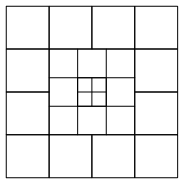 2305
2305This question also has a geometric approach to it:

Let the length of the innermost square be 1.
Area of the 4 innermost squares = 4 *(1x1) = 4 * 13
Area of the 8 outer squares = 8 *(2x2) = 4 * 23
Area of the 12 outer squares = 12 *(3x3) = 4 * 33
Length of each side = 2(1+2+3)
Therefore,
[2(1+2+3)]2 = 4 (13+23+33)
or,
(1+2+3)2 = 13+23+33
This can be generalized to n terms,
13+23+33.....+n3 = (1+2+3+...+n)2 = (n(n+1)2)2
 62
62I guess I had a similar one... on sum of squares..
The same logic works
A combinatorial proof...
Number of ways to chose 4 numbers w, x, y, z from {1, 2, ... n+1} so that z is greater than each of the other three
The number of ways by double counting...
when z=2 no of ways = 13 (w, x and y can be chosen in 1 way each)
when z=3 no of ways = 23 (w, x and y can be chosedn in 2 ways each)
when z=4 no of ways = 33 (w, x and y can be chosedn in 3 ways each)
...
...
...
when z=n+1 no of ways = n3 (w, x and y can be chosedn in n ways each)
thus one counting gives us
13+23+.... n3
NOw explain the other way .. I must leave somethign for you guys to think.. [3]
 11
11The proof that I had in mind while I gave this one was different Nishant sir.....[4]
Anyway nice tech....
 62
62The proof you have is
(1+x)4
(1+1)4 = .....
take the summation and see that a lot of terms of 4th power cancel each other..
(Is that in your mind?)
Bcos I dont know any other "good" proof!
 11
11Nope!
AAre the proof that I've in mind is not mine original, it's from a book and the proof reveals a few interesting things - that's the reason I came up with that particular thing, else u can manufacture a thousand and one proves of this theorem.....
This is what I want :-
Express k3 as an identity in terms of bionomial coefficients......
 62
62hmm.. I get what you are hinting at...
k3 = 6 kC3 + ... + ....
And then take summation?
 62
62k3 =6xkC3 + 2xkC2 + kC1
First check if what i have done is correct (Algebraically and Logically)
Then finish it off....
(I hope this is what soumik had in mind... !!)
 62
62Some one finishing this off?
 24
24Sir was reffering to this one for squares..
http://targetiit.com/iit-jee-forum/posts/squares-1042.html[1]

 Soumyabrata Mondal Antonella Cupillari and Warren Lushbaugh's proof Upvote·0· Reply ·2013-03-05 04:57:50
Soumyabrata Mondal Antonella Cupillari and Warren Lushbaugh's proof Upvote·0· Reply ·2013-03-05 04:57:50 Soumyabrata Mondal it's gr8
Soumyabrata Mondal it's gr8 Soumyabrata Mondal it's gr8
Soumyabrata Mondal it's gr8